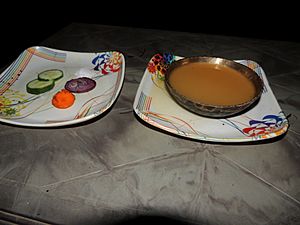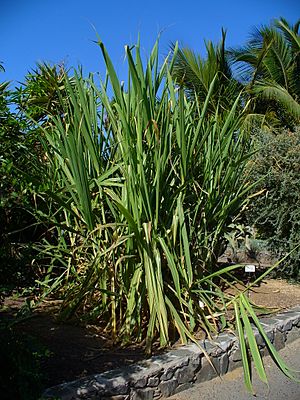Apo (drink) facts for kids
 |
|
| Type | alcoholic drink |
|---|---|
| Country of origin | Indian |
| Region of origin | Northeast India, Arunachal Pradesh and Assam |
| Ingredients | Fermentation of rice, Medicinal plants |
Apo or Apong is a special drink found among tribes in Northeast India. It's popular in states like Arunachal Pradesh and Assam. This drink is made by fermenting rice. People in different tribes have their own names for it.
For example, the Nyishi people in Arunachal Pradesh celebrate a festival called Nyokum every year. They serve apo during this time. When they drink it, they offer a few drops to the spirits, called wiyu, by letting it fall on the ground. Apo is also served during ancestor worship ceremonies and other festivals like Bihu, Dree, Solung, Mopin, Ali Aye Ligang, and agricultural programs.
Apo has different names depending on the tribe. It's called Haaz by the Ahom, Apong by the Mising, and Zou (or zu mai) by the Bodo. You won't find Apo in regular shops. It's a part of tradition and culture, passed down through families like a secret recipe. People usually make Apo at home and serve it with rice and chutney. It's enjoyed by everyone, no matter their age or gender. Many cultures around the world have similar traditional drinks, like Sake in Japan or Huangjiu and Mijiu from China.
Contents
History of Apo
We don't have written records about when Apo first started. But many people believe this tradition might be as old as the Stone Age! The word "Apo" isn't a general name for all rice drinks. Each tribe has its own name for their version. However, it's thought that the Mising people in Assam were the first to develop this traditional rice beer. So, the name "Apo" might come from their language.
Even though different tribes brew Apo slightly differently, they all use the same main ingredients for fermentation. This suggests that the brewing culture in Northeast India might have a common origin. Traditionally, two main types of Apo are made: Apong Nogin and Po:ro. A special ingredient called E'pob is used. These are starter cakes made from crushed rice and medicinal plants. These starter cakes are super important for all rice beers in the Northeast, including Apo. This shows how connected different tribal groups are through their traditions. Making Apo is often seen as something special, not an everyday thing. It's usually made for ceremonies, festivals, weddings, and big gatherings. Because of this, Apo is a big part of the identity and history of these regions.
Apo and the Mising People
Apo is known by many traditional names, depending on the tribe. But many believe the Mising people in Assam were the first to create it. The name "Apo" itself is thought to come from the Mising word "Apong." The Mising community lives in the Brahmaputra Valley of Assam, in areas like Lakhimpur and Sonitpur. Historically, they were known for collecting firewood and farming.
The Mising community is famous for its traditional cooking and food. They also have amazing knowledge about traditional medicines, passed down through generations. It's believed that their ancestors shared the method for making Apong beer, and it then spread to other tribes in Northeast India. The Mising community's cultural practices are unique, and Apong beer is a very important part of their culture, traditions, and rituals.
How Apo is Made
Apo is usually made in homes across Arunachal Pradesh and Assam. Even though there are different ways to brew it, the basic fermentation process is similar everywhere. This suggests they all learned it from a common source.
First, the rice for the drink is roasted until it turns black. Once cooked, it's mixed with a special ingredient called E-Pob. This E-Pob is made from rice and medicinal plants. The time it takes for the mixture to ferment changes with the weather. In summer, it might take 5–6 days. After fermentation, the mixture is filtered and poured into bamboo shoots. About 30 different medicinal plants, including leaves, creepers, and grass, are used in this process. The whole process of making Apo can take more than 3 months! It's quite a strong drink. Some studies suggest that Apo beer could even help the community economically, as the rice beers from the Northeast are known for their high quality.
The Apop Pitha (Starter Cake)
The starter cake, called 'apop pitha', is super important for making Apo beer. The Apo beer made by the Mising community is believed to have many health benefits. This is because of the special medicinal plants used in the 'apop pitha'.
The way beer is made can be different for each tribe. This depends on things like the environment and their cultural practices. These factors affect the color, flavor, and sweetness of the finished drink. A key part of making Apong is using the starter cake, 'apop pitha', which has special medicinal qualities. These qualities come from the medicinal plants used and how cleanly the beer is made.
To make 'apo pitha', people collect different kinds of medicinal plant leaves. These leaves are cleaned and dried on a bamboo mat called 'opoh'. Fresh leaves can also be used. The leaves are then ground separately using wooden tools and mixed together. This mixture is used to make oval-shaped balls of 'apop pitha' dough.
Some common medicinal plants and herbs used for 'apo pitha' include:
- Kuhiar (Saccharum officinarum)
- Senikuthi (Scoparia dulcis)
- Bhilongoni (Cyclosorus exlensa)
- Anaras (pineapple, also known as Ananas comosus)
- Bam kolmou (Ipomoea species)
- Kopou dhekia
- Lexuosum Lygodium flexuosum
- Lai jabori (Drymaria cordata)
- Horumanimuni (Hydrocotyle sibthorpioides)
- Jalokia (Capsicum annuum)
- Dhapat tita (Clerodendrum viscosum)
- Bormanimuni (Centella asiatica)
Traditional Health Benefits
Traditional Apo beer is believed to have several health benefits. This is because the starter cake is made using more than 39 different medicinal herbs! These herbs make the finished Apong beer a good source of nutrients. It's thought to give energy, have a soothing effect, and help with health issues like upset stomachs, urinary problems, body aches, headaches, and trouble sleeping. It's also traditionally used to help get rid of worms.
Most of the medicinal plants used for the beer grow naturally in the area. They have played a big role in helping tribal people stay healthy for a long time. The different types of Apo beer in Northeast India are seen as natural remedies for many health problems. This opens up exciting chances for scientists to study these traditional methods and learn more about the power of indigenous herbs and plants. Local people use both infusion (soaking) and decoction (boiling) methods to get medicine from plants for making Apo.
However, the way people live is changing. This can make it harder to find some of these medicinal herbs. For many tribal communities, like the Mising, these herbs are deeply connected to their culture. If these plants become scarce, it could affect the traditional knowledge of medicinal plants passed down through generations, and even the production of Apo beers.
Culture and Festivals
Apo is a very important part of the Mising people's culture and social life. It's served during all religious festivals and ceremonies in Assam, such as Midong, Fishing, Dabur, Bihu, and Ali Aye Ligang (Ali Ai Ligang).
The Ali Aye Ligang is a spring festival celebrated by the Mising community. It happens on the first Wednesday of the Assamese month called 'Fagun'. This festival celebrates the start of paddy cultivation (growing rice) in Assam. Traditionally, Apong is a must-have dish for this celebration. It's served along with pork ('purang apin') and boiled rice wrapped in leaves ('tupula that'). Apong is also offered to gods and spirits to make them happy. It's believed that the traditional way of making Apong hasn't changed much, even today, across different tribal communities.
Future of Apo
Apo is a special kind of rice beer that only comes from the tribal communities of Northeast India. It's been shared culturally for a long time. Its unique taste and quality come from the traditional, folk methods used to make it.
However, there isn't much scientific research on the health benefits of Apo beer. This makes it harder to sell it commercially, even though it could bring good economic opportunities to tribal communities like the Mising and Nyishi. Local experts and teachers are working hard to share knowledge about Apo beers and their benefits. They hope to get it recognized commercially. Even without big commercial sales, Apong is still a source of income and a way of life for many families in local markets, helping their communities grow.
 | Laphonza Butler |
 | Daisy Bates |
 | Elizabeth Piper Ensley |


